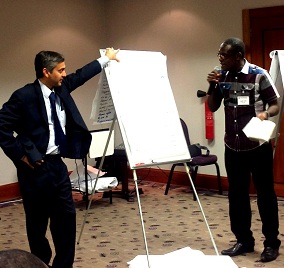March 2013
- Posting by PRAWA
- News

 On Monday 18 February 2013, Penal Reform International PRI delivered a five-day training of trainers workshop in Mozambique, 26 participants from 12 African Commonwealth countries met and engaged enthusiastically with the challenges facing their prison systems and, most importantly, put forward solutions to help overcome problems and limitations.
On Monday 18 February 2013, Penal Reform International PRI delivered a five-day training of trainers workshop in Mozambique, 26 participants from 12 African Commonwealth countries met and engaged enthusiastically with the challenges facing their prison systems and, most importantly, put forward solutions to help overcome problems and limitations.
The Day 2 of the workshop featured discussions on overcrowding and pre-trial detention in corrections and penal institutions around Africa. Delegates from countries present recognized that it is a pressing issue in their countries, but, what was encouraging was range of new and innovative ways these countries are addressing the problems. The training was an excellent forum for delegates to present and share this information with each other.
In this write up culled from PRI blog site the 10 innovative practices from the countries are enumerated here:
- Identifying and removing pre-trial remandees who have been detained past their pre-trial date or who should have been let out on bail initially. In Cameroon, the system allows for judges and prosecutors to go into the prisons and work with the prison authorities to analyze the files and identify those inmates who may have been held past their trial date or for very lengthy periods of time.
- The use of mobile courts within prisons, which reduce delays in trials and deal with the issue of transportation of prisoners to court for their trials. This system has been used in Kenya, where there is a system of mobile judges who move between the prisons to adjudicate cases, saving on transporting prisoners from prisons to the courts, which can cause delays and use scarce resources. In Ghana the ‘Justice for All’ system also uses mobile judges, specially selected by the Chief Justice, who move around prisons and review cases where the inmates have overstayed their sentence or remand time.
- Engaging with other criminal justice stakeholders (e.g. police, judiciary, probation, social services, NGOs) and creating interagency dialogue to discuss local issues and develop solutions. In Swaziland, there has been a reduction in overcrowding and the numbers of prisoners held on remand, partly due to the organization of regular stakeholder meetings between professionals in the criminal justice system, such as the police, prison authorities and judiciary, who analyze cases and discuss solutions to criminal justice challenges that face all the agencies.
- Using diversion, bail and fines rather than remand as a default option. In Mauritius, as in many other countries, bail and fines are often too high for most people to pay and many detainees are held for non-payment of fines, the Prison Service has begun liaise with the family and friends of the detainee, as well with as some NGOs, to pay the fines so that the inmate can be released more speedily.
- Using alternative dispute resolution as a means of decongesting the prison system. In Nigeria they are piloting a ‘Front Loading’ restorative justice programme in Lagos and Enugu, in which programme prison authorities identify cases that have been awaiting trial for lengthy periods of time and refer them to the Director of Public Prosecution. After analyzing the files, if the Director of Public Prosecution finds that the case is minor, they are approved for ‘front loading’. Contact is then made with both the offender and the victim and both are referred to the mediation centre where a trained facilitator attempts to bring the two parties to an agreement of restitution and reconciliation. Where this is achieved, a written agreement is signed and sent to the magistrate to sign in order to release the inmate. This frees up time for magistrates to deal with more serious cases and helps to reduce the overcrowding in prisons.
- Using alternatives to imprisonment. For example, in Botswana, offenders can be granted a sentence of extramural labor where they are registered at the prison but work each day and stays in their community. The prison is responsible for following them up by visiting their place of work monthly to monitor their progress.
- Establishing, updating and modernizing rehabilitation programmes so prisoners can gain relevant employment on release. In the Seychelles, inmates in the prison who have shown good conduct engage in paid work outside the prison, such as farming, fishing and construction, allowing them to save their earnings and gain skills.
- Using traditional and community courts/procedures. In Sierra Leone, they are using traditional courts to adjudicate minor offences, such as domestic and land disputes, reducing the backlog in the formal court system. The courts are run by community leaders and use mediation, impose small fines and for more serious matters, an appointed court chair may impose prison sentences of up to six months.
- Setting time limits for bringing cases to trial. For example, in Lesotho if a person is remanded in prison, the case must be brought to court within 60 days or they must be released.
- Many of the countries also indicated the need to de-stigmatize ex-prisoners to improve reintegration and reduce reoffending. They suggested education and awareness-raising among the public to show the impact of imprisonment.
The training is the second such workshop in a project sponsored by the Commonwealth Secretariat Human Rights Unit.
